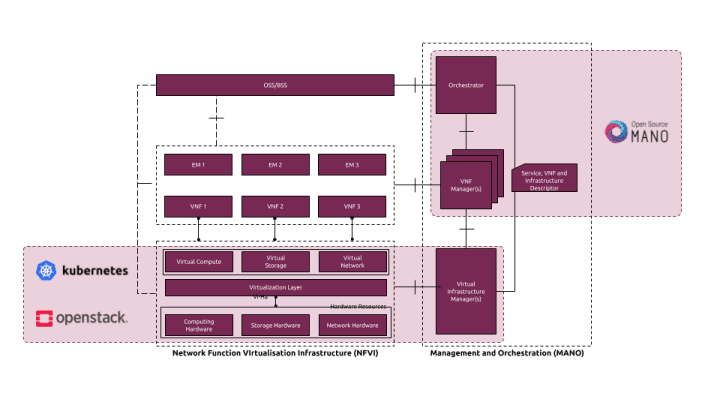Tytus Kurek
on 8 October 2020
The NFV&MEC Plugtests 2020, hosted remotely during the week of June 15-19th 2020 by ETSI, offered network function virtualisation (NFV) and mobile edge computing (MEC) solution providers, hardware vendors and other companies involved in open source initiatives an opportunity to meet and assess the level of interoperability between their solutions. An established leader in the NFV space, Canonical participated in this event and partnered with Supermicro to provide an NFV stack for the plugtests sessions. Detailed outcomes of this cooperation can be found in the official ETSI Plugtest Report.
About the NFV&MEC Plugtests 2020
NFV&MEC Plugtests have been organised by ETSI since 2017. For the last couple of years, more and more organisations have been participating in those events. We have also been observing a growing number of commercial virtual network functions (VNFs) joining the NFV Plugtests programme, including this year, for the first time, some fully functional 5G Core solutions which were able to pass not only basic NFV interoperability tests but also functional testing of 5G use cases.
During the event, a number of test sessions were conducted, covering aspects such as:
- NFV interoperability and API conformance
- MEC and MEC-in-NFV interoperability and API conformance
- Onboarding, instantiation and termination of network services and VNFs
- Lifecycle management, updates and scaling of network services
- Fault and performance management, VNF monitoring and closed-loop operations

All the participating implementations were accessible through the ETSI HIVE network. Most of the platforms and management and orchestration (MANO) solutions run remotely on participants’ labs, however, some were deployed locally on local infrastructure provided by ETSI. All VNF, container network function (CNF), MEC applications and network service packages were made available in a local repository hosted at ETSI and uploaded to the participating platforms during the pre-testing phase. All participating organisations were granted access to the HIVE network throughout the event.
Canonical’s test environment
In order to provide NFV infrastructure (NFVI) and MANO platform for the interoperability sessions during the NFV&MEC Plugtests 2020, Canonical hosted a carrier-grade infrastructure stack consisting of:
- Charmed Openstack (Stein) as a virtual infrastructure manager (VIM) for VNFs
- Charmed Kubernetes (1.17) as a VIM for CNFs
- Charmed OSM (Open Source MANO) (7.0.1) as a MANO platform
The entire stack was running on Ubuntu 18.04 LTS with the 5.3 kernel on 7 Supermicro servers, each with the following specifications:
- Model: SYS-F619P2-RT/RTN
- CPU: 2x Intel Xeon Gold 6238R
- RAM: 384 GB
- SSD: 6x Micron 5200 1.9 TB SAS3
- NIC 1: AOC-STG-i4T – 4-port 10GbE RJ45
- NIC 2: XAOC-MGP-i2Mm – 2-port 1GbE RJ45
The deployment of the platform was fully automated with MAAS and Juju.

NFV&MEC Plugtests 2020: the outcomes
The results of the tests run during the NFV&MEC Plugtests 2020 demonstrated the readiness of Canonical’s and Supermicro’s solutions for production deployments across a variety of NFV and MEC use cases. Canonical’s NFVI and MANO solutions successfully passed interoperability tests, demonstrating both stability and robustness. It is worth mentioning that Canonical’s MANO platform based on Charmed OSM was capable of orchestrating all participating VNFs and CNFs, including the 5G Core solutions.
As a general note from ETSI, the experimental cloud-native tests track allowed to test interoperability among 5 CNFs, 7 MANO solutions and 7 Kubernetes platforms from different providers for the first time. This testing showed an interoperability rate of 93% and triggered interesting discussions about how the NFV specs will evolve to allow for full automation of CNF onboarding and orchestration.
Moreover, during the preparation for the Plugtests, a new Robot Framework Test Suite was developed to enable Automated NFV IOP testing based on NFV SOL016 specifications. The test suite reuses existing NFV API Conformance Robot Test Suites and leverages existing NFV APIs to trigger operations and check final results in multi-vendor configurations. The interoperability rate for the automated test sessions was above 75% and the experimental test suite will be contributed to ETSI NFV.
For detailed outcomes from the NFV&MEC Plugtests 2020 refer to the official ETSI Plugtests Report.
Acknowledgements
The Canonical team would like to use this opportunity to thank Supermicro for providing the hardware for this event. Our joint participation in the NFV&MEC Plugtests 2020 not only resulted in passed interoperability tests but also stressed the partnership between Canonical and Supermicro on delivering carrier-grade NFV stack for service providers.
Learn more
In order to learn more about Canonical’s solutions for NFV, visit our website or watch the webinar – “NFV, cloud-native networking and OSM: everything you need to know”.
For more information about the Canonical – Supermicro reference stack for NFV, visit Supermicro’s website.



